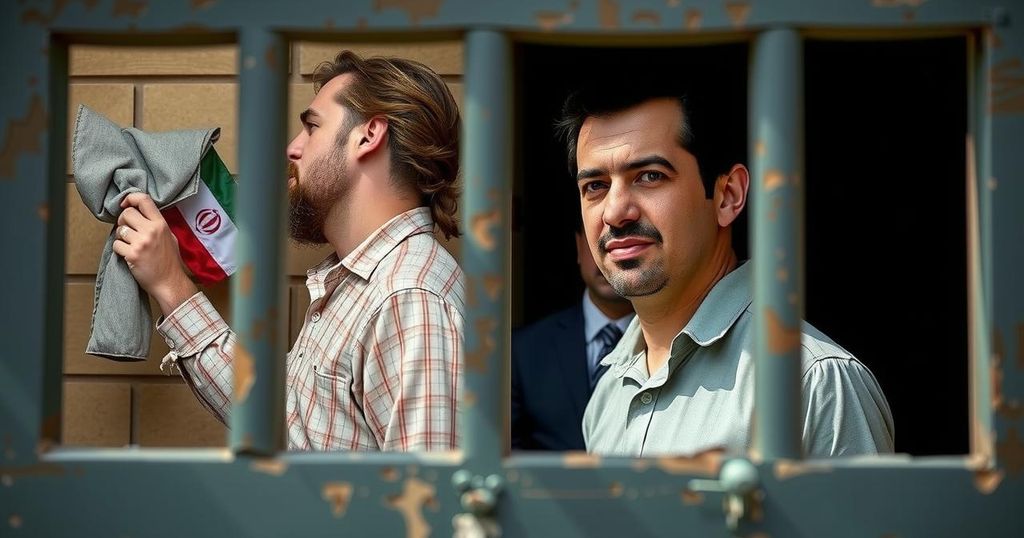Iran has requested a prisoner swap involving the release of an Italian journalist, Cecilia Sala, detained in Tehran, contingent upon Italy’s release of an Iranian held at U.S. request. Sala, arrested on vague charges, faces harsh conditions, prompting heightened demands from the Italian government for her release. The delicate negotiations reflect complex international relations between Iran, Italy, and the U.S.
Iran has communicated to Italy its intention to secure a prisoner exchange involving Cecilia Sala, an Italian journalist detained in Tehran. Tehran indicated that the release of Sala hinges on Italy freeing Mohammad Abedini Najafabadi, an Iranian whom U.S. authorities arrested for alleged involvement in a fatal drone attack. Despite previous silence on this demand, it appears the officials from Italy, including the Prime Minister, are working diligently to address the situation with care to avoid provoking Iran.
Cecilia Sala, aged 29, was arrested last month under undisclosed charges and has since been held in solitary confinement even while possessing a valid press credential. As reports emerged about her dire conditions—lack of essential items, confinement space, and restricted communication with her guardians—Italian authorities ramped up their calls for her immediate release, amidst concerns about the legal complexities that her case involves.
A potential link between Sala and Abedini’s cases was highlighted by the timing of their arrests. While Italian officials have refrained from publicizing any connection, Sala’s detention was notably confirmed by Iran’s Ministry of Culture on December 30, indicating violations in accordance with local laws. Moreover, the absence of formal allegations against her raises questions about the nature of her detention and speculations about Iranian intentions.
The legal battle for Abedini’s extradition is ongoing, marked by resistance from authorities in Italy who are reluctant to consider any leniency that could affect negotiations with Tehran. U.S. involvement has amplified the tension surrounding the situation, as American officials stressed the demand for the unconditional release of individuals unjustly held in Iran. Meanwhile, Sala’s family remains firm in their disappointment over the slow pace of negotiations, asserting that no justification can suffice for her continued detention.
Italy’s position reflects a divided approach; while it seeks justice for Sala, it must also navigate the delicate political landscape shaped by relationships with both Iran and the United States. The implications of a potential exchange could alter diplomatic dynamics, making this an intricate matter for Italian officials, who are simultaneously advocating for human rights while upholding their international obligations.
The case of Cecilia Sala and her detention in Iran has unfolded against the backdrop of escalating tensions and diplomatic complexities between Iran, Italy, and the United States. Sala’s arrest appears to be linked to the U.S. apprehension of Iranian national Mohammad Abedini Najafabadi in Italy, marking an interplay where diplomatic negotiations may rely heavily upon legal proceedings for both parties involved. The public outcry over Sala’s conditions underscores the urgency of Italy’s diplomatic efforts, as citizens and officials alike seek clarity and prompt resolution of the crisis. This incident illustrates the broader implications of international diplomacy and the ways in which individual cases can become focal points for geopolitical negotiations.
The demand for a prisoner exchange by Iran, linking the release of journalist Cecilia Sala to the fate of Iranian national Mohammad Abedini Najafabadi, highlights the intricate dynamics of international diplomacy. As Italian authorities negotiate delicately amidst public outcry for Sala’s release, the ongoing legal processes and potential implications of U.S. involvement add layers of complexity to the situation. The Italian government’s efforts reflect a commitment to securing Sala’s freedom while navigating sensitive political waters, showcasing the challenges faced in balancing human rights advocacy with international relations.
Original Source: www.iranintl.com






